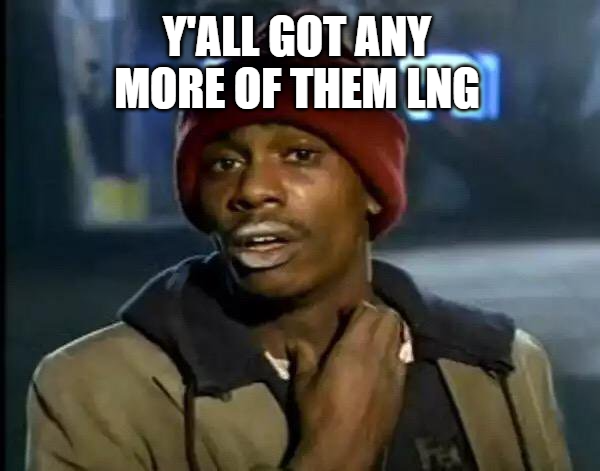
Under Investigation
Hi this is ZipLaw! We explain how news stories impact law firms so you can stand out in your applications.
Are you new here? Get free emails to your inbox.
Today we're talking about:
- 🏠 Housebuilders under investigation
- 🇶🇦 Qatar bets big on natural gas
- ⚖️ Clifford Chance leads on Volvo deal
MEMO
- 🇸🇪 Sweden's NATO Milestone: Sweden's finally on the brink of joining NATO, thanks to Hungary's parliament giving the thumbs up. This nod came almost two years after Sweden threw its hat in the ring, overcoming some pushback from Turkey and Hungary.
- 🤝 Microsoft's French Connection: Microsoft's playing nice with Mistral, a fresh French tech bud, letting it use its AI models on Azure, Microsoft's cloud kingdom. They're even buying a piece of Mistral, but mum's the word on how big a slice. This move adds to Microsoft's hefty $13 billion bet on OpenAI, stirring up some regulatory eyebrows in the US and UK.
- ✈️ Ryanair's Boeing Beef: Ryanair's not flying high with Boeing right now, thanks to some frustrating delays in getting new planes. This snag has Ryanair dialing back on how many folks they think they'll fly this summer and even talking about axing some flights.
- 🏦 China's Ant Group vs. Citadel: It's a financial face-off with China's Ant Group and Citadel Securities eyeing the same prize: Credit Suisse's Chinese securities gig. Ant Group, brainchild of Jack Ma, stepping into the ring might throw a wrench in UBS's plans, given the regulatory hoops and Ant's recent tiffs with regulators.
Housebuilders Investigation
In Short: The UK's Competition and Markets Authority (CMA) has launched an investigation into eight major housebuilders over potential anti-competitive practices related to information sharing, amid a broader inquiry into the UK's housing shortage.

What’s going on?
Picture this: the UK's top housebuilders, normally fierce competitors, potentially sitting around a metaphorical campfire, sharing not ghost stories, but something much more substantial – commercially sensitive information (Dun Dun Dunn). That's the scene the CMA seems to be painting as it dives into an investigation of giants like Barratt, Persimmon, and Taylor Wimpey, among others.
This revelation emerged from a larger probe into why the UK is struggling to meet its housing needs, with only 250,000 new homes built last year against a target of 300,000. While the primary culprits were identified as the "complex and unpredictable planning system" and an overreliance on "speculative private development," the potential information sharing among builders has raised eyebrows. This isn't about a lack of homes being built, but how the builders may be playing the game.
Why does it matter?
First off, if these allegations hold water, they could shake the very foundations of the UK housing market. Competitive markets thrive on, well, competition. If companies are sharing insider info, it could dampen the competitive spirit, potentially affecting everything from pricing to the variety of housing options available to consumers. Plus, there's the bigger picture: the UK's housing crisis isn't just about numbers; it's about accessibility, affordability, and quality.
The CMA's findings could lead to significant fines for the involved parties and even spark a broader debate on how the housing market operates. Moreover, with the CMA pushing for streamlined planning processes and better consumer protections, we could be on the brink of a housing revolution. Or, at the very least, a serious industry shake-up.
⚖️ How does this impact Law Firms?
Competition and Antitrust Law:
- Investigation and Compliance Advising: Lawyers specialising in competition law will be at the forefront, advising housebuilder clients on navigating the CMA's investigation. They'll conduct internal audits to assess and ensure compliance with competition laws, guiding clients on lawful information sharing and competitive practices. This involves scrutinising past communications and transactions to identify potential risks and advising on implementing robust compliance programs to prevent future breaches.
- Defence in Proceedings: For those housebuilders directly implicated, competition lawyers will be instrumental in defending against allegations of unlawful information sharing. This will involve representing clients in CMA proceedings, potentially challenging the CMA's findings or negotiating settlements. Lawyers will also prepare for any follow-on litigation, such as private claims for damages by affected parties, ensuring their clients are robustly defended at every turn.
Real Estate and Planning Law:
- Planning System Advisory: Given the CMA's criticism of the UK's complex planning system, real estate lawyers will see increased demand from developers seeking to navigate this system more effectively. They'll advise on securing planning permissions, appealing planning decisions, and potentially lobbying for planning reforms based on the CMA's recommendations. This advisory role extends to strategic planning to maximise development potential within the legal framework.
- Land Acquisition and Development Strategy: Lawyers in this field will also provide strategic advice on land acquisition, considering the CMA's findings on land banking. They'll help clients assess the viability of land for development, advising on acquisition strategies that mitigate risks related to competition concerns. This includes structuring transactions in a way that aligns with fair competition practices while still allowing for effective land banking as part of normal business operations.
Consumer Protection and Dispute Resolution:
- Quality Standards Compliance: In light of the CMA's concerns about housebuilders not competing on quality, lawyers with a focus on consumer protection will be in demand to advise clients on adhering to new and existing quality standards. They'll help develop comprehensive quality assurance policies and represent builders in disputes arising from alleged quality failures, such as substandard construction claims.
- Ombudsman Scheme Implementation: With the suggestion of establishing a New Homes Ombudsman, lawyers will guide housebuilders through the implications of this development. They'll assist in understanding the scope of the ombudsman's powers, the process of dispute resolution under this scheme, and how to comply with decisions made by the ombudsman. This includes preparing for and representing clients in any ombudsman proceedings.
Qatar's Bold LNG Expansion
In Short: Qatar is ramping up its liquefied natural gas (LNG) production with a significant investment, betting big on the growing global demand for energy.
What’s going on?

Qatar, a heavyweight in the LNG arena, is launching a multibillion-dollar project to boost its LNG exports by a whopping 16 million tons annually. This is on top of an already ambitious plan to increase production by 49 million tons per year. So, what's fuelling this mega move? Energy Minister Saad Al-Kaabi points to the world's growing appetite for gas, driven by population booms, especially in Asia, and a global economy shaking off its slumber. Europe's also in Qatar's sights for new energy deals.
But while Qatar is doubling down on gas, other parts of the world are hitting the brakes, wary of a potential supply glut and the global pivot towards greener energy sources. The U.S., Qatar's LNG rival, has even put a pause on new export licenses, mulling over the environmental and economic implications. This cautious stance is leaving smaller producers in a bind, reliant as they are on long-term contracts to fund their operations.
Why does it matter?
Qatar's bold strategy isn't just about cashing in on current demand; it's a calculated bet on the future of energy. With debates raging about when global gas demand might peak—some say as early as 2030—the move is not without its risks. Yet, Qatar's position as one of the most cost-effective LNG producers gives it a unique edge, allowing it to weather market fluctuations more robustly than most.
This expansion isn't just a big deal for Qatar; it's a significant moment for the global energy landscape. As Europe looks to diversify its energy sources and Asia's demand continues to surge, Qatar's LNG gambit could reshape energy flows and influence geopolitical dynamics for years to come. But with the shadow of climate change looming large, the world will be watching closely to see how this gas giant navigates the transition to a greener future.
⚖️ How does this impact Law Firms?
Energy and Infrastructure:
- Project Financing and Development Agreements: Lawyers specialising in energy and infrastructure will be in high demand to structure, negotiate, and document the complex financing arrangements required for Qatar's multibillion-dollar LNG expansion project. They will work closely with banks, financial institutions, and energy companies to ensure the project's funding is compliant with international finance regulations and safeguards investors' interests. This work will be crucial for clients involved in the energy sector, particularly those looking to invest in or develop large-scale infrastructure projects, as they navigate the intricate web of legal and financial requirements.
- Regulatory Compliance and Licensing: As Qatar seeks to increase its LNG exports, lawyers will guide clients through the maze of regulatory approvals and licenses required for such a significant expansion in production and export capacity. This will involve liaising with regulatory bodies, ensuring compliance with environmental laws, and advising on the legal implications of international energy trade agreements. Energy companies and multinational corporations involved in the LNG supply chain will rely heavily on legal advice to mitigate risks associated with regulatory non-compliance and to capitalise on emerging opportunities in the global energy market.
Environmental Law:
- Environmental Impact Assessments (EIA): Given the global focus on sustainability and the transition to greener energy sources, lawyers will play a pivotal role in conducting and reviewing EIAs for the LNG expansion project. They will advise clients on the legal obligations to minimise environmental impacts and on navigating the complex approval processes. This work will be critical for energy companies looking to expand operations while ensuring compliance with both domestic and international environmental standards, aiming to maintain their social license to operate amidst growing environmental concerns.
- Climate Change and Carbon Trading: As the energy sector faces increasing pressure to reduce carbon emissions, lawyers will advise clients on participating in carbon trading schemes and on compliance with greenhouse gas regulations. This will include negotiating carbon credit purchase agreements and advising on the legal aspects of implementing carbon offset projects. Energy companies, particularly those investing in or operating LNG facilities, will require legal guidance to adapt to the evolving regulatory landscape surrounding climate change, ensuring that their operations are sustainable and aligned with global carbon reduction commitments.
International Trade and Sanctions Law:
- Export Controls and Trade Sanctions: With Qatar aiming to lock in more deals in Europe and expand its global LNG exports, lawyers specialising in international trade will be essential in navigating the complex web of export controls and trade sanctions. They will ensure that contracts and trade activities comply with international laws and regulations, including those related to dual-use goods and technology transfers. This is particularly relevant for energy companies seeking to expand their market reach into new territories, where legal expertise is crucial to avoid breaches of trade sanctions that could result in significant penalties.
- Cross-Border Disputes and Arbitration: As Qatar expands its LNG exports, the potential for cross-border commercial disputes will increase. Lawyers will be instrumental in representing clients in international arbitrations and negotiations related to contractual disputes, investment protections, and trade agreements. This work will be vital for energy companies and investors involved in the international LNG market, as they seek to protect their interests and investments across different jurisdictions, ensuring that disputes are resolved efficiently and in accordance with international law.
Clifford Chance advises on Volvo Deal
In Short: Volvo Cars AB is significantly reducing its stake in Polestar, handing over 62.7% of its shares to Volvo shareholders, a move allowing it to refocus on its own growth while maintaining an 18% interest in the EV maker.

What is the deal? Volvo will reallocate a substantial portion of its equity in Polestar, an electric vehicle manufacturer, directly to its own shareholders. The process worked through a distribution of shares to its own shareholders, rather than selling the shares in the open market or to a specific buyer.
Here's a breakdown of how it worked:
- Share Distribution: Volvo Cars announced it would distribute 62.7% of its existing shares in Polestar to the shareholders of Volvo Cars. This means that the shares Volvo owned in Polestar would be directly passed on to Volvo's shareholders, effectively transferring a portion of the ownership from Volvo Cars directly to its shareholders.
- Remaining Stake: After this distribution, Volvo Cars would retain an 18% stake in Polestar. Before the distribution, Volvo Cars held approximately 48% of Polestar. By distributing a large portion of its shares, Volvo significantly reduced its ownership and influence in Polestar.
- Strategic Concentration: The rationale behind this move was for Volvo Cars to concentrate its resources on its own transformation and development, suggesting a strategic realignment of its investments and focus areas.
Key points to discuss
The main bit to discuss here is the significant stake reduction by Volvo Cars in Polestar. This move is a calculated strategy aiming to streamline Volvo's focus towards its own advancements and innovations in the automotive sector. By reallocating a large chunk of its Polestar shares to its shareholders, Volvo is essentially reshaping its investment portfolio, making a clear statement about where its priorities lie for future growth and development.
This operation can be quite complex and there are various areas lawyers will advise on. From ensuring compliance with international securities laws to managing the intricacies of shareholder agreements and regulatory approvals, the legal teams are instrumental in steering this deal towards fruition. Their expertise ensures that Volvo's strategic realignment complies with the stringent legal frameworks governing international corporate transactions.
Moreover, this stake reduction underscores a broader strategic vision, reflecting Volvo's commitment to its own transformation in an ever-evolving automotive landscape. By fine-tuning its investment focus, Volvo Cars is set to channel its efforts and resources more effectively, driving forward its ambitions in the automotive industry's new era.
Who is advising on this?
- Volvo Cars: Clifford Chance LLP for U.K. and U.S. law, and Mannheimer Swartling Advokatbyra AB for Swedish law.
- Financial Advisers to Volvo Cars: BofA Securities Inc. and Skandinaviska Enskilda Banken AB.
👀 ZIPMEMES

Don't forget...
🙏 Our work is reader-supported. You can get a membership for cheap!
🎥 Follow us on Instagram here or TikTok here.
📫 Forward this to a friend and tell them to subscribe (hint: it's here).
ZipLaw Newsletter
Join the newsletter to receive the latest updates in your inbox.





